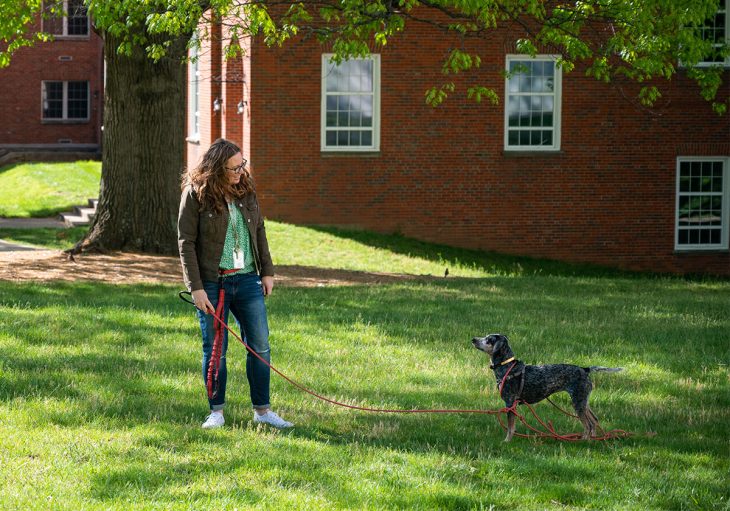
Popular Science wants to know what readers are curious about — no matter what it is. So somebody asked why dogs want to lick us.
To get the answer, the magazine reached out to Transylvania University professor Ellen Furlong ’03, who launched a Dog Behavior and Cognition Lab earlier this year. It’s part of Popular Science’s “Ask Us Anything” series.
“If we want to distill it down to one thing, it’s communication,” she said of the phenomenon. “But there are lots of different things that [dogs might be] communicating through a lick.”
Furlong urges us to consider the context — like if a dog is approaching you and looks excited and “wiggly,” all the licks are probably part of an enthusiastic greeting.
Another factor could involve a social hierarchy, when a lick can demonstrate submission and appeasement.
Or it could mean for you to go away or pay attention to something else. According to the Popular Science article: “The ‘lick to dismiss,’ [Furlong said], is a well-known behavior among canine researchers and trainers that signals a pet is trying to redirect someone or escape unwanted attention. A perfunctory lick or two on the face or hand, coupled with signs of stress like a rigid body, attempts to turn or move away, and visible eye whites are all signs of dismissal over greeting.”
Other possibilities for licking include stress relief (from an endorphin release), begging for a mother’s regurgitated food (as with wolf puppies), attention seeking and pack bonding.
Zachary Silver, a psychology professor at Occidental College and former student of Furlong’s when she taught at Illinois Wesleyan University, was quoted as saying we ultimately don’t know the reason for a dog’s licking. There just hasn’t been much research into the topic.
However, Silver’s studies have “revealed dogs to be deeply attached to their owners and aware of subtle social cues.” They also watch how we act around other people.
Popular Science concludes: “If dogs care enough to observe our human-to-human interactions and shift their behavior accordingly, then you can bet that their kisses aren’t without consideration.”
Transylvania’s canine cognition lab also recently got attention when Furlong, who teaches psychology and neuroscience, co-presented its work at the American Psychological Association annual convention this past summer.
Furlong also leads the May term class “Fido on the Couch,” featured on WKYT earlier this year.

